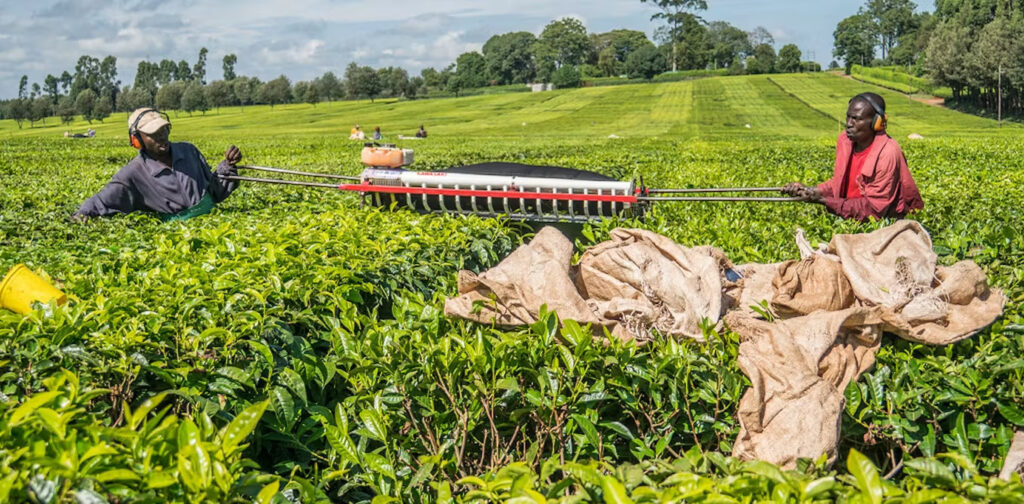- Africa’s agribusiness sector is undergoing significant transformations driven by population growth, urbanisation, technological advancements, and shifting consumer preferences.
- Alongside their role in stimulating economic growth, agribusiness and agro-industrial development have the potential to reduce poverty and foster social and economic growth.
- Technological advancements and digital transformations are revolutionising agribusiness in Africa, offering transformative opportunities.
Africa’s agribusiness sector potential
Agribusiness in Africa is undergoing significant transformations driven by population growth, urbanisation, technological advancements, and shifting consumer preferences. As a continent with abundant agricultural resources, Africa holds immense potential for agribusiness development.
African economic growth remains commodity-based, mainly on commodity exports, with minimal processing and value addition involved. To foster sustainable and inclusive growth and development in Africa, there is an urgent need to promote a new development approach based on exploiting the continent’s full agribusiness potential.
Some pressing issues call for a reorientation to support agribusiness and agro-industrial development, namely, poverty reduction and ensuring equitable growth patterns that will address the concentration of employment and livelihoods in the agricultural sector.
An agribusiness development path involving incredible productivity growth throughout the entire agribusiness value chain—covering farms, firms, and distributors—represents a solid foundation for rapid, inclusive economic growth and poverty reduction.
Agribusiness, economic growth and poverty reduction
Alongside their role in stimulating economic growth, agribusiness and agro-industrial development have the potential to reduce poverty and foster social and economic growth. Agro-industries are a crucial component of socially inclusive, competitive development strategies.
Strong synergies exist between agribusiness, agricultural performance, and poverty reduction in Africa. Efficient agribusiness will stimulate agricultural growth, and strong linkages between agribusiness and smallholders will reduce rural poverty.
Value addition in agribusiness is central to existing strategies for economic diversification, structural transformation, and technological upgrading of African economies. Such a focus can initiate faster progress toward prosperity by affecting most of the continent’s economic activities and harnessing critical linkages between the major financial sectors. This will, in turn, improve people’s welfare and living standards.
Technological evolution and digital transformation in agribusiness
Precision agriculture technologies, including remote sensing, drones, and GPS mapping, are helping farmers optimise inputs, monitor crop health, and enhance productivity. Agribusinesses can integrate these technologies into their operations to improve resource management, reduce costs, and increase yields.
Moreover, the widespread availability of mobile phones and internet connectivity in Africa has opened up new avenues for agribusiness. Mobile apps, e-commerce platforms, and digital marketplaces facilitate access to information, finance, and markets, connecting farmers and agribusinesses with consumers and buyers.
Artificial intelligence (AI) provides valuable insights for agribusiness decision-making. By analysing weather patterns, market trends, and crop performance, agribusinesses optimise production, minimise risks, and enhance profitability.
By adopting Climate-smart agriculture practices, such as conservation agriculture, agroforestry, and efficient irrigation systems, agribusiness promotes sustainable land use, water conservation, and resilience to climate shocks. Consequently, it ensures long-term viability and minimises environmental impacts.
Read Also: Africa’s agritech potential crucial for economic growth
Agro-industrial, value addition, quality control, and agro-processing
Agribusinesses enhance value by processing and packaging agricultural products. This includes transforming raw commodities into higher-value products such as processed foods, beverages, and packaged goods. Value addition promotes job creation, income generation, and export diversification.
Adhering to international quality standards and certifications is essential for accessing global markets. Agribusiness investments in quality assurance, traceability systems, and compliance with food safety standards enhance market competitiveness and consumer trust.
Agribusinesses can invest in research and development to create new products, improve processing techniques, and meet evolving consumer needs.
Access to finance and investment
Agribusinesses require access to affordable and tailored financial products, including credit, insurance, and investment capital. As such, access to finance and investment is crucial for the growth and sustainability of agribusiness in Africa.
Governments and financial institutions like the African Development Bank (AFDB), the UN, and the International Fund for Agricultural Development (IFAD) have continued to work tirelessly to ensure African countries access the financial assistance required to promote Agribusiness.
Additionally, African countries have experienced collaboration between the public and private sectors in promoting agribusiness development. Governments provide policy support, infrastructure development, and market facilitation, while private sector entities bring expertise, capital, and technological advancements.
Foreign direct investment (FDI) is vital in fostering growth. Governments are creating an enabling environment for FDI, including favourable investment policies, regulatory frameworks, and incentives that attract private investment in agribusiness value chains.
Factors derailing success in Africa’s agribusiness sector
Beyond growth, the continent needs transformation. The internal, external, and historical reasons for Africa’s slow industrial and agricultural growth can be attributed to the failure of policies often imposed.
There are also institutions and infrastructure designed to enhance the extraction of Africa’s resources rather than value addition, which affects the revolutionisation of the agribusiness sector.
Economic structural adjustment programs have also adversely affected technological adoption, human capital development, and the performance of manufactured exports.
Overcoming constraints to foster growth in agribusiness
A vigorous and enabling policy framework is needed in the African agribusiness sector. The policies will remove barriers to agro-industrialization.
Policymakers and the government should ensure a proper blend of agricultural, trade, and industrial policies to encourage an ample supply of raw materials and an efficient flow of processed products in the market.
Additionally, they should ensure that land and natural resources policies are recognized and adhered to to encourage productive land use and boost investor confidence.
Alternative funding sources should be explored, such as encouraging public-private partnerships in financing agribusiness or facilitating capacity building through technical and entrepreneurial skills training.
